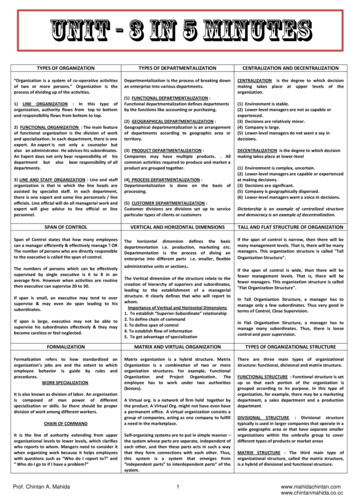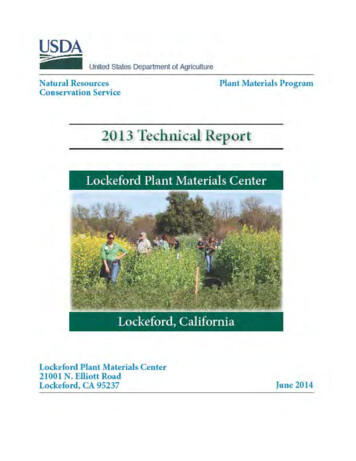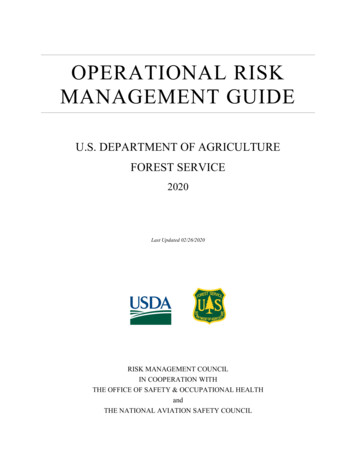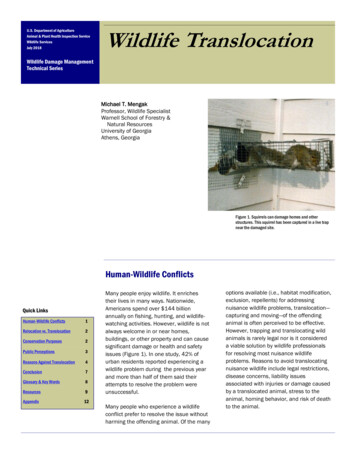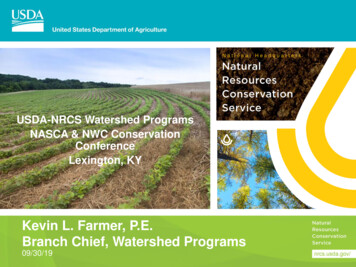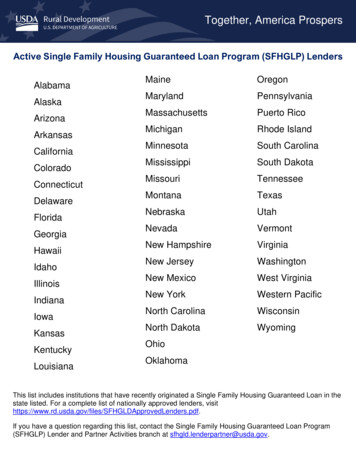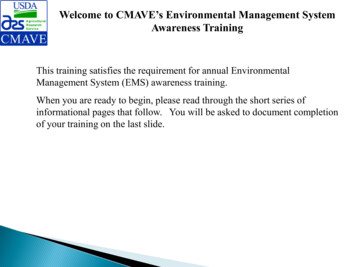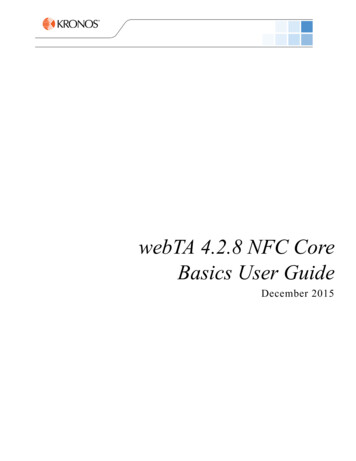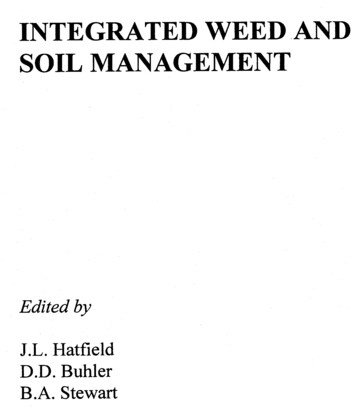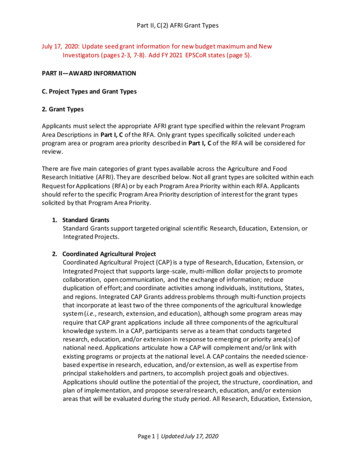
Transcription
Part II, C(2) AFRI Grant TypesJuly 17, 2020: Update seed grant information for new budget maximum and NewInvestigators (pages 2-3, 7-8). Add FY 2021 EPSCoR states (page 5).PART II—AWARD INFORMATIONC. Project Types and Grant Types2. Grant TypesApplicants must select the appropriate AFRI grant type specified within the relevant ProgramArea Descriptions in Part I, C of the RFA. Only grant types specifically solicited under eachprogram area or program area priority described in Part I, C of the RFA will be considered forreview.There are five main categories of grant types available across the Agriculture and FoodResearch Initiative (AFRI). They are described below. Not all grant types are solicited within eachRequest for Applications (RFA) or by each Program Area Priority within each RFA. Applicantsshould refer to the specific Program Area Priority description of interest for the grant typessolicited by that Program Area Priority.1. Standard GrantsStandard Grants support targeted original scientific Research, Education, Extension, orIntegrated Projects.2. Coordinated Agricultural ProjectCoordinated Agricultural Project (CAP) is a type of Research, Education, Extension, orIntegrated Project that supports large-scale, multi-million dollar projects to promotecollaboration, open communication, and the exchange of information; reduceduplication of effort; and coordinate activities among individuals, institutions, States,and regions. Integrated CAP Grants address problems through multi-function projectsthat incorporate at least two of the three components of the agricultural knowledgesystem (i.e., research, extension, and education), although some program areas mayrequire that CAP grant applications include all three components of the agriculturalknowledge system. In a CAP, participants serve as a team that conducts targetedresearch, education, and/or extension in response to emerging or priority area(s) ofnational need. Applications articulate how a CAP will complement and/or link withexisting programs or projects at the national level. A CAP contains the needed sciencebased expertise in research, education, and/or extension, as well as expertise fromprincipal stakeholders and partners, to accomplish project goals and objectives.Applications should outline the potential of the project, the structure, coordination, andplan of implementation, and propose several research, education, and/or extensionareas that will be evaluated during the study period. All Research, Education, Extension,Page 1 Updated July 17, 2020
Part II, C(2) AFRI Grant Typesand Integrated Project requirements described under Project Types (See AFRI Requestsfor Applications) apply to CAP Grants.3. Conference GrantsConference Grants support scientific meetings that bring together scientists to identifyresearch, education, and/or extension needs, update information, or advance an area ofscience. These activities are recognized as integral parts of scientific efforts. Support fora limited number of meetings covering subject matter encompassed by this solicitationwill be considered for partial or, if modest, total support. Individual conference grantsmay not exceed 50,000 in total costs and are not renewable. Indirect costs are notpermitted on Conference Grant awards. For all requests of 25,000 or more, applicantsshould consult with the program contact listed in the request for applications (RFA)regarding suitability of the application for submission to the relevant program areapriority.Letter of Intent is required for all Conference Grants and must be submitted a minimumof 195 days before the conference begins. Applications must be submitted after LOIdecision response and a minimum of 150 days before the conference begins.4. Food and Agricultural Science Enhancement GrantsFood and Agricultural Science Enhancement (FASE) Grants strengthen sciencecapabilities in research, education, and/or extension programs. FASE Grants aredesigned to help institutions develop competitive projects, and to attract new scientistsand educators into careers in high-priority areas of national need in agriculture, food,and environmental sciences. FASE Grants provide support for Pre- and PostdoctoralFellowships, New Investigators, and Strengthening Grants. Specific eligibilityrequirements for these grants are described below.a. Pre- and Postdoctoral Fellowships GrantsPre- and Postdoctoral Fellowships Grants provide fellowships to predoctoral, andpostdoctoral students in the agricultural sciences. The program goals are to preparethe next generation of scientists through doctoral and postdoctoral fellowships.b. New Investigator GrantsAn individual who is beginning their career, does not have an extensive scientificpublication record, and has less than five years postgraduate career-track experienceis encouraged to submit an application for a New Investigator Grant for research,education, and/or extension activities. The new investigator may not have receivedcompetitively awarded Federal research funds as Project Director (PD) with theexception of pre- or postdoctoral grants and AFRI Seed Grants. Federal fundingreceived by the applicant as Co-PD of previously awarded competitive grants doesnot count against New Investigator eligibility.Page 2 Updated July 17, 2020
Part II, C(2) AFRI Grant TypesEligibility requirements for a New Investigator Grant apply only to the PD and not toCo-PDs or collaborators. The application must contain documentation that lists allprior federal support. The work proposed for New Investigator Grants must address aspecific Program Area Priority described in Part I, C of the RFA.New Investigator Grant applications do not need to adhere to the eligibilityrequirements described for Strengthening Grants below unless they are applyingunder both grant types.Starting in FY 2021, there are two types of New Investigator Grants available: The first is a Standard Grant (i.e., New Investigator Standard Grant), which is aStandard Grant application in all respects except that the Project Directormeets the eligibility criteria described previously for New Investigators. Theseare reviewed with all other Standard Grant applications submitted to therespective program area priority, with special consideration given by NIFAprogram staff to funding of New Investigator Standard Grant applications thatfall below the funding line. In these cases, the New Investigator box must bechecked under FASE on the AFRI Project Type form. Individuals qualifying as New Investigators are also eligible to apply for a SeedGrant (i.e., New Investigator Seed Grants described subsequently) regardlessof institutional affiliation and eligibility for Strengthening Grants describedsubsequently. An individual applicant may submit only one Seed Grant as PDduring the current fiscal year. New Investigators also may only receive oneNew Investigator Seed Grant as PD during their career. New Investigator SeedGrant applications will be reviewed with other Seed Grant applicationssubmitted to the respective program area priority with special considerationgiven to funding of New Investigator Seed Grant applications. In these cases,both the New Investigator and Seed Grant boxes should be checked underFASE on the AFRI Project Type form.c. Strengthening GrantsThese funds are expected to enhance institutional capacity with the goal of leading tofuture funding in the project area, as well as strengthen the competitiveness of theinvestigator’s research, education, and/or extension activities. Strengthening Grantsconsist of Seed Grants, Equipment Grants, Sabbatical Grants, Strengthening StandardGrants, Strengthening Coordinated Agricultural Projects (CAP) Grants andStrengthening Conference Grants. The work proposed for Strengthening Grants mustaddress specific Program Area Priorities described under Program Area Descriptionsin Part I, C., of the RFA. All applications submitted for Strengthening Grants mustfulfill the eligibility requirements described below.Page 3 Updated July 17, 2020
Part II, C(2) AFRI Grant Types1) Strengthening Grants EligibilityStrengthening grants are limited to 1) small and mid-sized or minority-servingdegree-granting institutions that previously had limited institutional success forreceiving Federal funds or 2) State Agricultural Experiment Stations or degreegranting institutions eligible for USDA Established Program to StimulateCompetitive Research (EPSCoR) funding. The grants submitted by theseinstitutions are eligible for reserved strengthening funds for Research, Education,Extension, and Integrated Project grants. See the Flow Chart for StrengtheningGrant Eligibility to assist with determining eligibility for Strengthening Grants.Eligibility requirements for Strengthening Grants apply only to the PD’s institutionand not to the institutions of Co-PDs or collaborators.2) Strengthening Grants Eligibility Definitionsa) EPSCoR States (FASE & EPSCoR Program)Every year, the National Institute of Food and Agriculture (NIFA) determinesthe states that are eligible for USDA EPSCoR funding. This list includes stateshaving a funding level no higher than the 38th percentile of all States based ona 3-year rolling average of AFRI funding levels, excluding FASE Strengtheningfunds granted to EPSCoR States and small-midsized and minority-servingdegree-granting institutions. Please see the applicable list below for yourspecific RFA.FY 2020:For FY 2020 AFRI RFAs including the FY 2020 AFRI Education and WorkforceDevelopment RFA, the eligibility determinations are based on the dataobtained from grants made through the AFRI program from 2016 through2018. For FY 2020, the following States meet the requirements for thiscategory:State issippiMontanaNew HampshireNew MexicoNorth DakotaOklahomaRhode IslandAbbreviationAKCTHIIDLAMEMSMTNHNMNDOKRIPage 4 Updated July 17, 2020
Part II, C(2) AFRI Grant TypesState NameSouth CarolinaSouth DakotaUtahVermontWest VirginiaWyomingAbbreviationSCSDUTVTWVWYOther entities eligible for USDA EPSCoR funds in FY 2020 include the followingUnited States commonwealths, territories, possessions and their successors,and the District of Columbia:NameAmerican SamoaDistrict of ColumbiaGuamMicronesiaNorthern MarianasPuerto RicoVirgin Islands (U.S.)AbbreviationASDCGUFMMPPRVIFY 2021:For FY 2021 AFRI RFAs including AFRI Foundational and Applied Science RFAapplications for 2021 deadlines, while significant FY 2020 funds areunobligated, the eligibility determinations are based on the data obtained fromgrants made through the AFRI program from 2017 through 2019. For FY 2021,the following States meet the requirements for this category:State ttsMississippiMontanaNevadaNew HampshireNew JerseyNew MexicoNorth NDOKPage 5 Updated July 17, 2020
Part II, C(2) AFRI Grant TypesState NameRhode IslandSouth CarolinaSouth DakotaUtahVermontAbbreviationRISCSDUTVTOther entities eligible for USDA EPSCoR funds in FY 2021 include the followingUnited States commonwealths, territories, possessions and their successors,and the District of Columbia:NameAmerican SamoaDistrict of ColumbiaGuamMicronesiaNorthern MarianasPuerto RicoVirgin Islands (U.S.)AbbreviationASDCGUFMMPPRVIb) Small and mid-sized institutions are academic institutions with a current totalenrollment of 17,500 or less, including graduate and undergraduate as well asfull- and part-time students. An institution in this instance is an organizationthat possesses a significant degree of autonomy as defined by beingindependently accredited in the current version of the Higher EducationDirectory, published by Higher Education Publications, Inc., 1801 Robert FultonDrive, Suite 340, Reston, Virginia 20191 (Phone: (888) 349-7715;www.hepinc.com).c) Minority-serving institutions are academic institutions whose enrollment of asingle minority group or a combination of minority groups (as defined in PartVIII, D of the RFA) exceeds 50 percent of the total enrollment, includinggraduate and undergraduate as well as full- and part-time students.Applicants applying under this category should indicate the current percentageof applicable minority students enrolled at the institution in a cover letter. Aninstitution in this instance is an organization that possesses a significant degreeof autonomy as defined by being independently accredited in the currentversion of the Higher Education Directory, published by Higher EducationPublications, Inc., 1801 Robert Fulton Drive, Suite 340, Reston, Virginia 20191(Phone: (888) 349-7715; www.hepinc.com).Page 6 Updated July 17, 2020
Part II, C(2) AFRI Grant Typesd) Limited institutional success is defined as institutions that are not among themost successful universities and colleges for receiving Federal funds for scienceand engineering research and development. See the AFRI RFA Resources page(“Table 1 Most Successful Institutions” in the attachments list) for analphabetical list of the most successful institutions.All institutions grouped under one main campus as listed in Table 1 MostSuccessful Institutions, unless located in an EPSCoR state, are excluded fromeligibility for all strengthening funds. The institution may petition for anexemption to this rule as described in Part III, B of the RFA.3) Strengthening Grant TypesAn individual applicant may submit only one of the following types ofstrengthening applications (Sabbatical Grants, Equipment Grants, and SeedGrants) as Project Director (PD) during the current fiscal year. Investigators areencouraged to contact the appropriate Program Area Priority Contact, regardingsuitability of project topics to verify that their submission is appropriate to theprogram area priority. For Equipment Grants, investigators are encouraged tocontact the appropriate Program Area Priority Contact regarding appropriatenessof requested equipment for topics within program area priority requirements.a) Seed GrantsSeed Grants are to provide funds to enable investigators to collect preliminarydata (which may be obtained through establishing new domestic orinternational collaborations) or perform other preliminary activities inpreparation for applying for future grants from AFRI. The grants are notintended to fund stand-alone projects, but rather projects that will lead tofurther work applicable to one of the AFRI Program Areas. Seed Grantapplications proposing an Integrated Project only need to include one of thethree functions (research, education, extension) and justify how this SeedGrant will allow the applicant to become competitive for future IntegratedProject funding.New Investigators are also eligible to apply for a Seed Grant (i.e., NewInvestigator Seed Grant). Individuals applying for a New Investigator SeedGrant must meet the eligibility criteria for New Investigators describedpreviously, but do not need to meet eligibility for Strengthening Grants. Inthese cases, both the New Investigator and Seed Grant boxes should bechecked under FASE on the AFRI Project Type form. An individual NewInvestigator applicant may submit only one Seed Grant as PD during thecurrent fiscal year. New Investigators also may only receive one NewInvestigator Seed Grant during their career.Page 7 Updated July 17, 2020
Part II, C(2) AFRI Grant TypesSeed Grants are limited to a total of 300,000 (including indirect costs) for upto 2-years in duration and are not renewable. All Seed Grant applicationssubmitted to the respective program area priority will be reviewed together,with separate funding considerations given to Strengthening-eligible SeedGrants and New Investigator Seed Grant applications.b) Equipment GrantsEquipment Grants are designed to strengthen the research, education, and/orextension capacity of institutions by funding the purchase of one major pieceof equipment. These grants are not intended to replace requests forequipment in individual project applications. Rather, they are intended tohelp fund items of equipment that will upgrade infrastructure. Requests forcomputer equipment are allowed only if the equipment is to be used in anactivity integral to the proposed project. Requests for computer equipmentwill not be permitted if the equipment will primarily serve as a wordprocessor or perform administrative functions.Each request shall be limited to one major piece of equipment within the costrange of 10,000- 250,000 and are not renewable. The amount of Federalfunding requested shall not exceed 50 percent of the cost or 50,000,whichever is less. Unless a waiver is granted by NIFA using the criteria listed inPart III, C., of the RFA, it is the responsibility of the PD to secure requiredmatching funds with non-Federal funds (see Part III, C for more information).No installation, maintenance, warranty, or insurance expenses may be paidfrom these grants, nor may these costs be part of the matching funds. Indirectcosts are not permitted on Equipment Grant awards.c) Sabbatical GrantsSabbatical Grants are to provide an opportunity for faculty to enhance theirresearch, education, and/or extension capabilities by funding sabbaticalleaves. Collaborative arrangements, domestic or international, areencouraged. Grants will be limited to one year of salary and funds for traveland supplies, where justified, and are not renewable.NIFA also encourages and will support the concept of “mini-sabbaticals” forfaculty and researchers desiring short-term training to learn new techniquesthat will improve their competitiveness. These short-term trainingopportunities generally follow all of the sabbatical requirements describedbeginning in Part IV, C., of the RFA but for a shorter duration. These grantsmay be used to participate in short courses offered at various researchinstitutions.Page 8 Updated July 17, 2020
Part II, C(2) AFRI Grant Typesd) Strengthening Standard GrantsStandard Grant applications that meet the eligibility requirements forStrengthening Grants are eligible for reserved strengthening funds asStrengthening Standard Grants. The eligibility requirements only apply to thelead PD and are not required for Co-PD(s) associated with the project.e) Strengthening Coordinated Agricultural ProjectsCoordinated Agricultural Projects (CAP) grant applications that meet theeligibility requirements for Strengthening Grants are eligible for reservedstrengthening funds as Strengthening CAP Grants. The eligibility requirementsonly apply to the lead PD and are not required for Co-PD(s) associated withthe project.f) Strengthening Conference GrantsConference Grant applications that meet the eligibility requirements forStrengthening Grants are eligible for reserved strengthening funds asStrengthening Conference Grants. The eligibility requirements only apply tothe lead PD and are not required for Co-PD(s) associated with the project.5. Other Grants (Collaborative)The Collaborative Project Grant is a type of Research, Education, Extension, orIntegrated Project that allows AFRI programs to partner resources with other fundingorganizations, domestic or international, to address high priority mission areas ofmutual interest, without either organization transferring funds to the other. For AFRIprograms soliciting Collaborative Project Grants, a single proposal is submitted to theprogram; it must contain all of the requisite sections for an AFRI application, in additionto information that may be outlined in the specific program description. The overallproject must demonstrate an integrated, collaborative approach; the specificcontributions and responsibilities of the AFRI and partner agency teams to theobjectives must be set out clearly in the proposal’s project narrative and reflected in thebudget justifications. The advantages of the multi-organizational effort must be clearlydescribed in the Project Narrative, as well as the specific managerial arrangements toass
The first is a Standard Grant (i.e., New Investigator Standard Grant ), which is a . with special consideration given by NIFA program staff to funding of New Investigator Standard Grant applications that fall below the funding line. In these cases, the New Investigator box must be . Grant El
